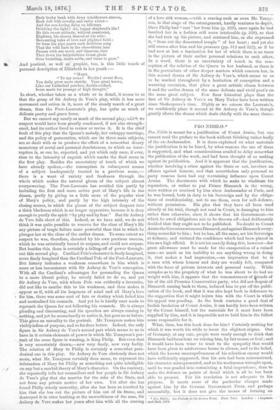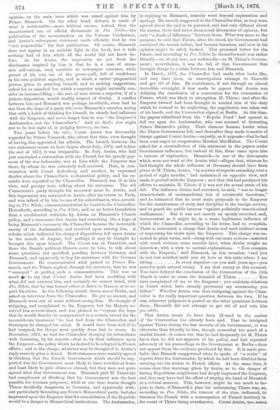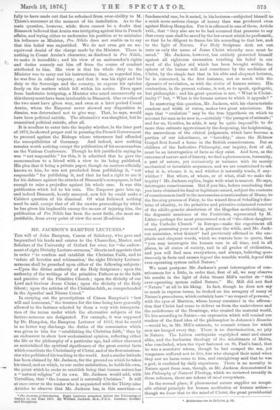PRO NIHILO.*
Pro Nihilo is meant for a justification of Count Arnim, but one. cannot read the preface to the book without thinking rather badly- of the ex-Ambassador. It is there explained on what materials- the justification is to be based, by what reasons the use of them is supported, and what considerations availed to delay somewhat the publication of the work, and had been thought of as making against its publication. And it is apparent that the justification,. whether involving a crime against the State or not, involves au offence against honour, and that nevertheless only personal or party reasons have had any restraining influence upon Count Arnim. The documents with which he seeks to vindicate hia reputation, or rather to put Prince Bismarck in the wrong, were written or received by him when Ambassador at Paris, and he was bound, both in duty to his Sovereign and by the obliga- tions of confidentiality, not to use them, even for self-defence, without permission. His plea that they have all been used already at his trial, though not read in Court, is damaging to him rather than otherwise, since it shows that his Government—to which he owed obligations not to be thrown off—had deliberately decided that they ought not to be published. No doubt to Count Arnim the Government means Bismarck, and against Bismarck every- thing seems fair to him ; but he has, all the same, set his Sovereign at defiance, and violated the confidence which had been placed in him as a high official. It is not his merely doing this, however—for great allowance must be made for the exasperation of a ruined man—so much as his inability to see anything wrong in doing it, that makes a bad impression,—an impression that he is a man with whom honour and duty are weakly felt, compared with the force of private interests and personal vanity. While scruples as to the propriety of what he was about to do had no weight with him, it appears that the remonstrances of iends of his of the old Prussian Conservative party, who did not aespair of Bismarck coming back to them, induced him to put off the publi- cation of the book, and that it was also kept back in deference tn the suggestion that it might injure him with the Court in which his appeal was pending. As the book contains a good deal of foolish laudation of Count Arnim, it can hardly have been written by the Count himself, but the materials for it must have been supplied by him, and it is impossible not to hold him in the fullest sense responsible for it.
What, then, has this book done for him ? Certainly nothing for which it was worth his while to incur the slightest stigma. Out of Germany, at any rate, people were ready enough to think that Bismarck had been bent on raining him, by fair means or foul ; and it would have been wiser to trust to the sympathy that would. have been given to misfortunes borne in silence, and to the belief, which the known unscrupulousness of his relentless enemy would have sufficiently supported, that his acts had been misconstrued, his character misrepresented, and so his weaknesses wrought upon, until he was goaded into committing a fatal imprudence, than to- make the defence on points of detail which is all he has been able to present. For his revelation is not adequate to his purpose. It meets some of the particular charges made against him by the German Government Press, and perhaps successfully, but it does not give the means of forming an
• Pro Naito: the Prelude to the Arnim 2'rlat. First Part. London : Chapman and Hall. 1876.
opinion on the main issue which was raised against him by Prince Bismarck. On the other hand, defence is made of what is indefensible—more without excuse, indeed, than the unauthorised use of official documents in Pro Alihdo—the publication of the memorandum on the Vatican Conference, and Arnim's subsequent statement made officially that he was "not responsible" for that publication. Of coarse, Bismarck does not appear in an amiable light in this book, but it tells nothing bad of him which all the world did not know be- fore. As for Arnim, the impression we get from the disclosures inspired by him is that he is a man of exces- sive self-esteem, very sensitive to newspaper censures, while proud of his own use of the goose-quill, full of confidence in his own political sagacity, and in short, a rather pragmatical person, given to asserting himself, and to making suggestions, called for or uncalled for, which a superior might naturally con- sider as intermeddling,—the sort of man whom a superior, if of a jealous disposition, would readily suspect of rivalry. A conflict between him and Bismarck was perhaps inevitable, even had he not been the hope of a party who were Bismarck's enemies, seeing that with a habit of thinking for himself, he clearly had influence with the Emperor, and never forgot that he was "the Emperor's Ambassador, not the Chancellor's." And no doubt tins ought not to be lost sight of, in judging betweea the two.
Two years before his rah:, Count Arnim was favourably regarded by Prince Bismarck, who, about that time, even thought of having him appointed his adlatus. The breach between the two statesmen seems to have begun about July, 1872, and before the end of 1872, it was irreparable. In July, Arnim, who had just concluded a convention with the French for the speedy pay- ment of the war indemnity, was at Ems while the Emperor was there, by whom he was extremely well received. Here, in con- versation with Count Eulenberg and another, he expressed doubts about the Chancellor's ecclesiastical policy, and his re- marks were reported to the Chancellor. Bismarck was ill at this time, and gossips were talking about his successor. The old Conservative party thought his successor must be Arnim, and this impression was conveyed to Arnim after his return to Paris, and was talked of by him to one of his subordinates, who, accord- ing to Pro Nihilo, communicated what he heard to the Chancellor. Henceforth, according to Pro Nihilo, and on no better foundation than a confidential criticism by Arnim on Bismarck's Church policy, and a statement that Arnim had something like a hope of -being Bismarck's successor, the Chancellor became the inexorable 'enemy of the Ambassador, and resolved upon raining him. A rebuke which indicated his changed dispositions fell upon Arnim in the month of August, but perhaps it may be thought he brought this upon himself. The Count was at Frankfort, and there the Danish publicist-Hansen came to him, to talk about some questions, not specified, pending between Germany and Denmark, and apparently to beg his assistance with the German Government. He communicated what passed to Prince Bis- marck, and the Prince replied, through his secretary, that he was 4‘ annoyed" at getting such a communication. This was as much es to say that Count Arnim had been meddling with what did not concern him, and certainly we cannot think, with Pro Nihilo, that he was bound either to listen to Hansen or to re- port his views. In the following month Arnim was at Berlin, and asked an interview from the Chancellor. He got no answer, and Bismarck went out of town without seeing him. He thought of resigning, and complained to the Emperor, but his Majesty re- ceived him several times, and was pleased to "express the hope that he would thereby be compensated to a certain extent for the inconsiderate treatment" he had had from the Chancellor, and thereupon he changed his mind. It would have been well if he had resigned, for things went quickly from bad to worse. In December, 1872, we find the Chancellor charging his subordinate with thwarting, by his reports—that is, by their influence upon 'the Emperor—the policy vrhich he desired to be adopted in French affairs ; and to the charge, whatever may be thought of it, Arnim's reply scarcely gives a denial. Both statesmen were amiably agreed in thinking that the French Government which should be sup- ported was the Government most likely to have troubles at home and least likely to gain alliances abroad, but they were not quite agreed what that Government was. Bismarck paid M. Thiers the bad compliment of thinking that his Government was the best possible for German purposes ; while at one time Arnim thought 'iers decidedly dangerous to Germany, and apparently with- out particularly favouring any French Monarchical party, had also impressed upon the Emperor that the consolidation of the Republic would be a danger to Monarchical institutions. The Ambassador, in replying to Bismarck, scarcely went beyond explanation and apology. He naively suggested to the Chancellor that, as they were agreed about the end to be pursued, and had only differed about the means, there had never been a real divergence of opinion, but only "a shade of difference " between them. What was more to the purpose, he said that Thiers, after the shock his Government bad sustained the mouth before, had become harmless, and now in his opinion might be safely backed. This promised better for the future, and according to Pro Nihilo, he thenceforward-was rather friendly—or, at any rate, not unfriendly—to M. 'Thiers's Govern- ment; nevertheless, it was the fall of that Government that brought things to a crisis between him and Bismarck.
In March, 1873, the Chancellor had made what looks like, and may have been, an unscrupulous attempt to discredit and get rid of him. By contrivance, if not through an almost incredible oversight, it was made to appear that Arnim was delaying the conclusion of a convention for the evacuation of France, which was likely to strengthen M. Thiers ; and after the Emperor himself had been brought to remind him of the duty which he seemed to be neglecting, the negotiation was taken out of his hands, and the Convention signed at Berlin. At this time, the papers-subsidised from the "Reptile Fund" had opened in full cry upon the Ambassador, who was accused of thwarting Prince Bismarck's policy. Their clamour became louder when the Thiers Government fell, and thereafter they made it matter of charge against Count Arnim—unjustly, as it appears—that he had been over-eager to congratulate Marshal MacMahon. The Count Raked for a contradiction of this statement in the papers under Government influence, but instead of this, there came upon him a torrent of reproaches. Bismarck—in one of the documents which were not read at the Arnim trial—alleges that, whereas he had thought the whole influence of Germany should have been given to M. Thiers, Arnim, "in a series of reports extending over a period of eight months," had maintained an opposite view, and made it prevail with the Emperor ; and that this had paralysed his efforts to maintain M. Thiers, if it was not the actual cause of his fall. The influence Arnim had exercised, he said, "was no longer characteristic of ambassadorial, but of ministerial functions," and he intimated that he must make proposals to the Emperor for the maintenance of unity and discipline in the foreign service, and to guard the public interest "against politically unauthorised malfeasance.' But it was not merely an openly exercised and, inconvenient as it might be, in a sense legitimate, influence of which the Chancellor, according to his letter, had to complain. There is insinuated a charge that Arnim had used indirect means of impressing his views upon the Emperor. This charge was re- newed in plain terms, and—along with one more serious--asserted with mach violence some months later, when Arnim sought an interview, with a view to mutual explanations. "You conspire with the Empress," said Bismarck, on this occasion, "and you do not rest satisfied until you sit here at this table where I am
sitting In every superior—so you said years ago—you perceive your natural enemy,. I am that enemy at this moment. You have delayed the conclusion of the Convention of the 16th March in order to cause the downfall of Thiers You have complained of me to the Emperor ; you maintain relations at Court which have already prevented my summoning you hither." Whether Arnim was thus intriguing against the Chan- cellor is the really important question between the two. If he was, whatever judgment is passed on the other questions between them, Bismarck did not attempt to get rid of and ruin him pro nihilo.
That Arnim seems to have been ill-used in the matter of the Convention has already been said. That he intrigued against Thiers during the last months of his Government, or was otherwise than friendly to him, though somewhat too much of a candid friend—it comes out that he had frequently let M. Thiers know that he did not approve of his policy, and had reported adversely of his proceedings to the Government at Berlin—does not appear from the evidence produced by him. It is made pro- bable that Bismark exaggerated when he spoke of "a series" of reports from the Ambassador, by which he had been disabled from carrying out his wishes in French affairs. At the same time, it seems clear that warnings given by Arnim as to the danger of having Republican neighbours had deeply impressed the Emperor, and they may have had the effect of staying the hand of Bismarck at a critical moment. This, however, might be too much to im- pute to them, if Bismarck's plan for maintaining Thiers was, as, according to Pro Nihilo, the rumour of the time indicated, to threaten the French with a reoccupation of French territory in the event of Thiers being overthrown. Count Arnim, too, seems fully to have made out that he refrained from over-civility to M. Thiers's successor at the moment of his installation. As to the main question,' however, while there cannot be a doubt that Bismarck believed that Arnim was intriguing against him in French affairs, and trying either to undermine his position or to minimise his influence as Minister, Pro Nihilo does not enable us to say that this belief was unjustified. We do not even get an un- equivocal denial of the charge made by the Minister. There is nothing in Count Arnim's character, as disclosed in Pro Nihilo, to make it incredible ; and his view of an ambassador's rights and duties scarcely cut him off from the course of conduct attributed to him. His view is that his whole duty to the Minister was to carry out his instructions; that, as regarded him, he was free in other respects ; and that it was his right and his duty to the Sovereign and the country, to express his opinion freely on the matters which fell within his notice. Even apart from backstairs intriguing, a Minister who acted unreservedly on this theory must have been intolerable to Bismarck. One or otherof the two must have given way, and even at a later period Count Arnim, whom the Emperor never showed any disposition to dismiss, was determined not to give way. That, he says, would have been political suicide. The alternative was slaughter, but he committed political suicide, after all.
It is needless to enter into the inquiry whether, in the later part of 1873, he showed proper zeal in pressing the French Government to proceed against the Bishops whose utterances had offended
the susceptibilities of Germany. And indeed, now nothing remains worth noticing except the publication of his memorandum on the Vatican Conference. Though he felt justified in saying he was "not responsible" for this, it is admitted that he gave the memorandum to a friend with a view to its being published. His plea that it being a private paper, though on matters officially known to him, he was not precluded from publishing it, "not responsible" for publishing it, and that he had a right to use it for his defence against the attacks of Bismarck's newspapers, is bad enough to raise a prejudice against his whole case. It was this publication which led to his ruin. The Emperor gave him up, and indeed Bismarck, keenly annoyed, now felt he could make a Cabinet question of his dismissal. Of what followed nothing need be said, except that of all the unwise proceedings by which he has given his implacable enemy the means of injuring him, the publication of Pro Nihilo has been the most futile, the most un- justifiable, from every point of view the most ill-advised.




































 Previous page
Previous page